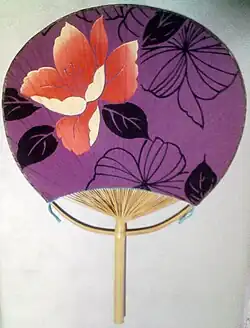うちわ
Japanese
Etymology 1
| Alternative spelling |
|---|
| 団扇 |

団扇 (uchiwa, dansen): a Japanese rigid hand fan.
Compound of 打ち (uchi, “hitting; batting”, the 連用形 (ren'yōkei, “continuative or stem form”) of verb 打つ utsu, “to hit, to bat”) + 羽 (wa, “wing”). The kanji are an example of jukujikun.[1][2]
Noun
Derived terms
- 軍配団扇 (gunbai uchiwa): a rigid fan used for military signaling
- 団扇撞木鮫 (uchiwa shumokuzame)
Etymology 2
| Alternative spelling |
|---|
| 内輪 |
References
- Shōgaku Tosho (1988) 国語大辞典(新装版) [Unabridged Dictionary of Japanese (Revised Edition)] (in Japanese), Tōkyō: Shogakukan, →ISBN
- Matsumura, Akira, editor (2006), 大辞林 [Daijirin] (in Japanese), Third edition, Tōkyō: Sanseidō, →ISBN
- NHK Broadcasting Culture Research Institute, editor (1998), NHK日本語発音アクセント辞典 [NHK Japanese Pronunciation Accent Dictionary] (in Japanese), Tōkyō: NHK Publishing, →ISBN
- Kindaichi, Kyōsuke et al., editors (1997), 新明解国語辞典 [Shin Meikai Kokugo Jiten] (in Japanese), Fifth edition, Tōkyō: Sanseidō, →ISBN
This article is issued from Wiktionary. The text is licensed under Creative Commons - Attribution - Sharealike. Additional terms may apply for the media files.